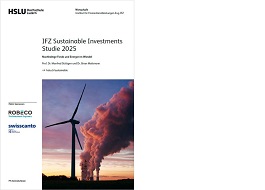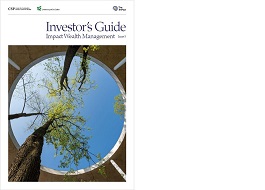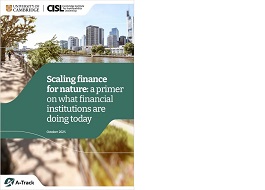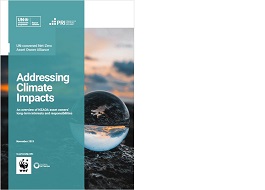| |
|
|
| |
|
|
| |
|
SSF Newsletter November 2025
|
| |
|
From Risk to Opportunity
|
| |
|
Dear Sir or Madam,
|
| |
|
The 30th UN Climate Change Conference (COP30) in Belém draws to a close, with global studies confirming the 1.5°C target is out of reach. For Switzerland, projections warn of 2.8°C warming, bringing more heatwaves, droughts, and floods. This year’s disasters in vulnerable mountain regions underscore the urgent need for action.
Against this backdrop, the second edition of our Swiss Sustainable Lending Market Study, conducted with the ZHAW School of Management and Law, reveals encouraging trends. A clear majority of banks (87%) have strengthened their institutional frameworks and formalized sustainability strategies for their lending business. For retail clients, sustainable lending advice is now well-established, with a focus on energy efficiency and property value preservation in the mortgage sector. However, the study also highlights a critical gap: advising SMEs and large companies is far less prevalent, with uniform standards to guide banks’ efforts still missing.
COP30 brought hopeful signals, like Denmark’s new ambitious climate goal and Brazil’s initiative Tropical Forest Forever Facility. Finance keeps playing a key role in accelerating the needed shift. Moving from risk management to seizing opportunities supports this trend. Globally, adaptation finance for measures such as early warning systems, can cut long-term costs. In Switzerland, banks can even better support homeowners, SMEs, and corporations in meeting net-zero targets, helping clients save costs and comply with regulations. We are more than motivated to support our members with valuable insights and adequate tools in their work. The path is clear: align finance with climate action.
|
|
| |
|
|
Kind regards,
Jacqueline Etter
Lead Communication & Member Relations
|
| |
|
|
|
| |
|
|
| |
| |
| |
|
SSF activities at a glance
|
| |
|
| |
|
Launch of Swiss Sustainable Lending Market Study 2025
|
| |
|
The new Swiss Sustainable Lending Market Study 2025 was published by Swiss Sustainable Finance. Again, the second edition of the study was created in collaboration with ZHAW. This new market study provides insights into the integration of ESG factors in the Swiss lending markets and applied sustainability indicators for sustainable lending products. Over 50 participants joined us for the launch event. Download the study and read more about the launch event.
|
| |
|
|
|
| |
| |
|
First Newsletter of the Swiss Platform for Impact Investing (SPII)
|
| |
|
The SPII, hosted by SSF, published its first newsletter providing an overview on key activities of the platform. It features an introduction on AI as a tool for impact by SPII Executive Board member, Ingo Weber. Sign up for the newsletter to stay posted on Swiss Impact Investing activities.
|
| |
|
|
|
| |
| |
|
Interview in the "We Build Bridges" Series
|
| |
|
Romain Leroy-Castillo, our Director Education & AI, has provided his insights on key developments in carbon markets in the current year. In the interview in the aftermath of Building Bridges 2025, he summarizes the development of the past year and shares his perspective on how markets may will evolve.
|
| |
|
|
|
| |
| |
|
SSF exponents provide input at various sustainable finance events
|
| |
|
|
|
|
| |
|
|
| |
| |
| |
|
Regulatory and market news
|
| |
|
| |
|
Swiss News
- The new climate scenarios published by the Federal Office of Meteorology and Climatology, MeteoSwiss, predict a significantly higher temperature increase in Switzerland than the global average. The scenarios are relevant for financial service providers for improved risk assessments for Swiss-based assets.
European News
- The leaked SFDR 2.0 draft suggests a simplification of the framework and a replacement of existing product categories. By integrating disclosures, removing certain obligations (such as investment-advice coverage), and introducing minimum exclusions and thresholds, the reform is expected to streamline implementation and reduce uncertainty for the industry.
- The European Banking Authority (EBA) published the new guidelines on environmental scenario analysis, complementing their guidelines on the management of ESG risks. These support a better management of both short-term, and medium- to long-term risks.
International News
Market News
- Morningstar published its yearly Voice of the Asset Owner Survey. Climate transition readiness, energy management, and physical climate risk are the most frequently mentioned environmental factors. Furthermore, the share of asset owners viewing ESG considerations as fiduciary duty increased from 53% to 61% compared to last year’s study.
- MSCI has presented its new MSCI Biodiversity Index Screen, expanding the focus of sustainability from carbon to biodiversity. MSCI’s method quantifies nature’s interdependency, providing a new indicator to assess environmental risks.
- In anticipation of the currently on-going COP 30, TNFD produced a series of publications.We highlight two papers with relevance to the market: their Guidance on nature in transition providing guidelines for corporates' transition planning and the Discussion paper on nature-related opportunities featuring case studies of nature-related opportunities trying to foster market action.
- WWF has published a strategic framework examining the spreading insurance gap. The paper suggests facing destruction stemming from nature events with reduction of GHG emissions (prevention & mitigation). It focuses on nature-based solutions (adaption & resilience), and risk transfer solutions (residual risk transfer).
- The SIFEM Impact Report 2025 highlights strong progress in promoting sustainable economic growth across 72 emerging-market countries, supporting nearly 600,000 jobs and facilitating 8.7 million loans through partner institutions.
|
|
| |
|
| |
| |
|
New SSF members and network partners
|
| |
|
| |
|
We are happy to welcome the following organisation as new SSF member:
The full list of our members and network partners, now standing at 265 can be found here.
|
|
| |
|
| |
| |
|
Upcoming sustainable finance events
|
| |
|
|
|
| |
- 24 – 26 November 2025: 14th United Nations Forum on Business and Human Rights, United Nations, Geneva
- 25 November 2025: «Carbon Disclosure Project (CDP) – Experiences and Challenges» SSF Roundtable Discussion, SFF, online (SSF members only)
- 26 November 2025: Sustainable Investing Platform Meeting, SSF, Zurich (SSF members only)
- 1 December 2025: Bridging Finance and Sustainability from Geneva to Zurich, Building Bridges and SFG, Geneva
- 10 December 2025: Sustainable Investing - Here to Stay. Edition 3, Value creation from investment selection to active ownership, SSF, online
- 11 December 2025: Digesting the 30th Climate COP in Belém, Zurich Carbon Market Association, Zurich
Further events are listed on the SSF website.
|
|
| |
|
|
|
| |
|
- 25 October 2025, Strategische Verantwortung, Finanz und Wirtschaft (Print)
Visit our website for more articles.
|
|
| |
|
|
|

|
| |
|
IFZ Sustainable Investments Studie 2025
|
| |
|
Lucerne University of Applied Sciences and Arts (HSLU) published the IFZ Sustainable Investments Studie 2025. Among other interesting findings, the study observes that, although fund inflows into sustainable funds have overall declined considerably. Only 110 from 237 sustainable funds registers net inflows. Although, the net inflows (+ CHF 49 Billion) outperform the net outflows (CHF -45 Billion) the share of sustainable funds with positive net inflows has declined from roughly 75% to below 50% in the past two years. However, at the same time 69% of newly invested money flows of Swiss Retail Banks flow into sustainable funds.
|
|
More >
|
| |

|
| |
|
Investor’s Guide: Impact Wealth Management
|
| |
|
The guide prepared by CSP in collaboration with The ImPact and University of St. Gallen finds that the 13 wealth managers reflected in this medium on average allocate 30% of client assets to sustainable strategies, though impact investing remains far smaller at just 3.3%. However, these results are not representative and a huge variance has been detected across the wealth managers. Furthermore, the report highlights that impact measurement and ongoing values alignment vary widely across firms, underscoring the importance of robust governance, transparent reporting, and organizational commitment to impact.
|
|
More >
|
| |
|
|

|
| |
|
State of Banking Transition 2025
|
| |
|
The State of the Banking Transition 2025 report, published by the TPI Global Climate Transition Centre, a collaboration of the Transition Pathway Initiative (TPI) and London School of Economics (LSE), analyses the progress of 36 large multinational banks on the low-carbon transition. It measures the progress based on two parameters: the Net Zero Banking Assessment Framework and Carbon Performance for Banks. The results show that the vast majority of the banks are still at the beginning of their transition process and have not made any progress during the past year.
|
|
More >
|
| |

|
| |
|
Scaling Finance for Nature: Barrier Breakdown
|
| |
|
In response to the narrative that nature finance does not provide market returns, the Cambridge Institute of Sustainable Leadership (CISL) published the paper: Scaling finance for nature. Authors argue that by assessing nature impacts and then choosing an appropriate lever for change, it is possible to scale nature finance across the economy. They identify four key levers for catalyzing nature finance: through stewardship activities, strategic financial decision making, the use of financial incentives, and targeted political dialogues.
|
|
More >
|
| |
|
|

|
| |
|
Adressing Climate Impacts
|
| |
|
The paper published by the UN Environment Program Finance Initiative and the Principles for Responsible Investment (PRI) appeals to the responsibility of the asset owners. It argues that asset owners must account for climate risk and invest in mitigating action in order to ensure long-term economic growth and build resilience. Therefore, it is crucial that asset managers identify these long-term risks and act in the best interest of their clients by allocating the assets accordingly.
|
|
More >
|
| |
|
|
| |
|
Would you like to find out more about recent developments in sustainable finance and members-only SSF activities? SSF members receive access to additional resources. Join our growing community to profit from it.
|
|
| |
|
| |
|
Kind regards
The SSF Team
|
| |
|
|
|
| |
|
|
| |
|
SWISS SUSTAINABLE FINANCE
|
|
|
| |
|
|
| |
|
|
| |
|
|
| |
|
|
| |
|
|
| | |














